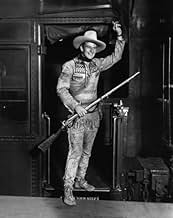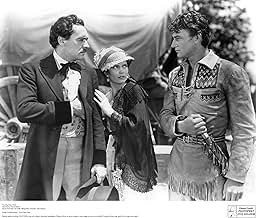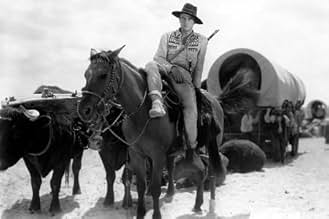Breck Coleman leads hundreds of settlers in covered wagons from the Mississippi River to their destiny out West.Breck Coleman leads hundreds of settlers in covered wagons from the Mississippi River to their destiny out West.Breck Coleman leads hundreds of settlers in covered wagons from the Mississippi River to their destiny out West.
- Awards
- 5 wins total
- Red Flack
- (as Tyrone Power)
- Wagon Train Man
- (uncredited)
- Pioneer
- (uncredited)
- Indian
- (uncredited)
- Sid Bascom
- (uncredited)
- Pioneer
- (uncredited)
- Wrangler
- (uncredited)
- Pioneer Child
- (uncredited)
Featured reviews
The plot is rather similar to CIMARRON--a Western that came out the following year and which captured the Oscar for Best Picture. Unfortunately, CIMARRON isn't all that great a film and I actually like THE BIG TRAIL more due to the scope of the film. While some might balk at THE BIG TRAIL's slow-moving pace, I saw it as a great history lesson about the hardships endured by those traveling West on wagon trains. Plus, the whole thing just looked so beautiful, as director Raoul Walsh went to significant trouble to film on location and THE BIG TRAIL looks almost like a film version of some Ansel Adams prints.
As for the acting, it was pretty good. This was a major break for young John Wayne--as his previous screen appearances were, at best, minor and unremarkable. Here, he was given the lead and did a dandy job--though he was obviously young and a little less "John Wayne-ish" than he was in later films, as his screen persona was not yet firmly established. Another interesting part was played by Tyrone Power II (Tyrone Power's father). He looked nothing like his extremely handsome son and looked and sounded almost exactly like Bluto from the Popeye cartoons! He made very few sound films--dying just a year after making this film--so it's a rare opportunity to see and hear this once famous actor.
Overall, the film is well worth seeing despite some sound problems and a few overly long scenes here and there. For 1930, it was a remarkable achievement--more so than the much more famous and award-winning CIMARRON made the following year. Much of the reason THE BIG TRAIL didn't win an Oscar most likely was because ALL QUIET ON THE WESTERN FRONT came out the same year and it is truly one of the great films.
But we're here to talk about The Big Trail. John Ford's fellow director Raoul Walsh spotted this tall kid on the set of one of Ford's films and thought he had potential. He wanted to make him the lead in a big budget western that Fox was planning to do. The film as planned would be an homage to the famous classic silent western The Covered Wagon.
In watching The Big Trail I was struck by how similar Wayne's character of Breck Coleman here is to the Ringo Kid in Stagecoach. Both characters were likable young cowpokes, but both were also on a mission of vengeance. And of course both films were done on location and show the expense in making them. No studio product here with a backlot western set.
I also don't think that it was an accident that Wayne got this break at the beginning of the sound era. Raoul Walsh, I'm guessing looked around Hollywood and probably didn't think a whole lot of movie cowboys would have staying power in sound. That's something else Walsh spotted in Wayne.
According to what I've read The Big Trail flopped because after spending all that money to make the film in an early wide screen process, some genius at Fox realized that their theaters weren't equipped with the wide screen to show it. And when the Great Depression hit there would be no money to widen those screens at Fox movie houses. So The Big Trail got a limited release, even in what we would call a formatted version, and lost money big for Fox films.
Marguerite Churchill is fine as the crinoline heroine who Duke wins, loses and wins again from Ian Keith. Keith, Charles Stevens and F. Tyrone Power are the trio of villains Wayne has to deal with.
F. Tyrone Power is the father of the famous movie legend Tyrone Power. He was a big burly man with a grand background in classic roles on screen and on stage. I wouldn't be surprised if his son who would have been 15 at the time might not have been hanging around the set.
Also look for Ward Bond though you might have trouble spotting him under a big bushy beard.
Watching The Big Trail now it is interesting to speculate where John Wayne's career might have gone if The Big Trail had been a big hit.
Did you know
- TriviaIncredibly, six different versions of this film were shot simultaneously: (1) a 70mm version in the Grandeur process for exhibition in the biggest movie palaces, (2) a standard 35mm version for general release, (3) a 35mm alternate French-language version La piste des géants (1931)', (4) a 35mm alternate Spanish-language version La gran jornada (1931), (5) a 35mm alternate German-language version Die große Fahrt (1931), and (6) a 35mm alternate Italian-language version Il grande sentiero (1931). The four alternate-language versions were shot with (mostly) different casts.
- GoofsBased on the 26 star flag (1837-1845), the film takes place in the 1840s. Many of the settlers use Springfield Model 1873 "trapdoor" rifles. This was common in Hollywood because the 1873 was based on the 1861 rifled musket, which closed a continuous line of muskets going back to 1795, so it easily could stand in for a muzzle loading musket to the untrained eye.
- Quotes
Breck Coleman, Wagon Train Scout: We can't turn back! We're blazing a trail that started in England. Not even the storms of the sea could turn back the first settlers. And they carrie dit on further. They blazed it on through the wilderness of Kentucky. Famine, hunger, not even massacres could stop them. And now we picked up the trail again. And nothing can stop us! Not even the snows of winter, nor the peaks of the highest mountain. We're building a nation and we got to suffer! No great trail was ever built without hardship. And you got to fight! That's right. And when you stop fighting, that's death. What are you going to do, lay down and die? Not in a thousand years! You're going on with me!
- Crazy creditsOpening credits prologue: DEDICATED- To the men and women who planted civilization in the wilderness and courage in the blood of their children.
Gathered from the north, the south, and the east, they assemble on the bank of the Mississippi for the conquest of the west.
- Alternate versionsFilmed in two versions simultaneously: widescreen process Grandeur in 70mm, and in standard 35mm. Some scenes were shot simultaneously in both formats; other scenes were shot twice, once for each format. The two versions are not identical in content - the 70mm version runs 125 minutes, while the 35mm version runs a shorter 108 minutes (but does contain some scenes not found in the longer widescreen version).
- ConnectionsAlternate-language version of La gran jornada (1931)
- How long is The Big Trail?Powered by Alexa
Details
Box office
- Budget
- $2,000,000 (estimated)
- Runtime
- 2h 5m(125 min)
- Color























